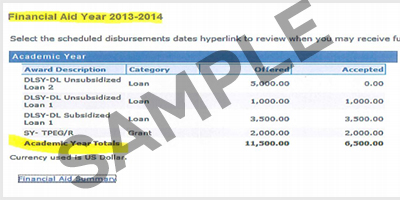- Houston Independent School District
- Step 4 - FAFSA English
-
Your Award Letter
Step 4: Accepting your Award Letter
What is an Award Letter?After your FAFSA has been processed you will receive an award letter from each college you have been accepted to detailing how much financial aid you will receive.When and how will I receive my Award Letter?In the old days, colleges mailed an award letter to a student. Now, colleges expect you to log into your financial aid account and review your award letter online.
You should expect your award letter 4 to 8 weeks after your FAFSA has been processed. Remember, that before a college will send/create an award letter for you, you must FIRST clear up any verification issues.
If you do not receive an email from your college’s financial aid office in 4 weeks, you should contact them and find out why you have not received an award letter.
How do I accept my Award Letter?First, if you do not accept your award letter the college will assume you do not want financial aid. In other words, you won’t get any money!
Log into your college financial aid account and go to a section (generally called) award letter or accept award offers.
You will have the opportunity to accept or not accept your financial aid. You can accept all or part of your financial aid offer. If you do not want to take out loans, then you can decline them.When do I get my financial aid and how do I pay for classes?Once you accept your financial aid , funds will be moved into your college account. You will also receive a college debt card in the mail, which will allow you to pay for books.
When you register for classes (sign up), you will be asked how do you wish to pay. You can apply your financial aid at this point.
Frequently Asked Questions:Do I have to accept loans?No you do NOT. A good rule of thumb is NOT to take out more than $5,000 a year in loans.What if I don’t have enough grant (free money) to pay for college?- Contact your college’s financial aid office and explain to them your situation (you need additional grant funding to pay for college). If you parents have experienced financial hardships in the past few months, the college might lower your EFC.
- Consider less expensive schools. If you were accepted to a private school and will have to take out thousands in loans a year then you might consider a state college or attending a community college the first two years.
Previous


